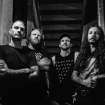Poring through Cult Leader's back catalog, you realize that vocalist Anthony Lucero's relationship with God — or perhaps the Gods — is a complicated one. Early on, the cover art to the primarily Salt Lake City–based band's devastating 2015 debut LP, Lightless Walk, pictured a pair of hands with barbed wire ripping though their palms, stigmata-style, while wrecking ball-heavy crust assaults like "Hate Offering" had the group's vocalist criticizing the "fake love" organized religion offers to the faithful. Christianity comes back to haunt Lucero on the band's equally massive new full-length, A Patient Man, which finds him unpacking the guilt and shame instilled in him by the church at an early age. ("As a boy they taught me how to hate myself," he howls on "Share My Pain")
"It left huge scars," says the frontman, now living in L.A. apart from the rest of the quartet, of his experience attending a religious private school in Utah. "Writing about it is [a] way to work through all that shit I got saddled with when I was way too young to deal with it."
While weary of religious institutions, A Patient Man also has Lucero placing trust in a more elemental deity: Achlys, the Greek personification of sadness and misery. The record's "To: Achlys" is a much more somber affair than Cult Leader's usual in-the-red terrorscaping, one of four album pieces that has Lucero using a brooding baritone while guitarist Mike Mason, bassist Sam Richards and drummer Casey Hansen approach the melancholy, slowcore feel of early Red House Painters.
Lucero temporarily offers himself up to the "daughter of the dark" on "To: Achlys" — in the music video for the track, he revels in the shadowy figure's embrace — but he also alludes, with hope, that by the time the sun rises, he will be "made new." Building on the themes of anxiety and loneliness that enveloped Lightless Walk, this newer piece serves as statement on riding out waves of depression throughout a lifetime. "I just think that you can't ever actually shake that kind of shit," he says of the cyclical nature of depressive feelings, later adding of A Patient Man's central theme, "It's another way of trying to acknowledge that it's there, but you're doing your best to work past it."
Caught on his cell phone outside of Dodgers Stadium, where he's watching a play-off game between his adopted hometown team and the Milwaukee Brewers, Cult Leader's frontman explains to Revolver how long-distance Skype sessions, his religious upbringing, and some Google research led to the creation of A Patient Man.
YOU'RE LIVING IN LOS ANGELES, THEN?
ANTHONY LUCERO Yeah, I've been living here for about a year and a half. Coming up on two, actually.
WHAT BROUGHT ON THE CHANGE?
My girlfriend lives here. Being a music hobo, it seemed kind of lame to ask her to move to Utah and uproot her life. It was easier for me to move down here.
HOW HAS THAT CHANGED HOW THE BAND WORKS?
Everyone else is still there [in Salt Lake City]. It basically just means writing this record took about twice as long as usual. Skype and the internet help a lot, but we're the type of band that [usually gets] in a room, tears everybody's music apart, and puts it back together. The band wrote a lot more with just the three of them; sometimes I was Skyping in. Everybody still has the same veto power, but the process took a lot longer.
ODDLY ENOUGH, AS OF RIGHT NOW IT'S THREE YEARS TO THE DAY SINCE LIGHTLESS WALK CAME OUT. THAT WAS A HEAVY RECORD DEALING WITH THEMES OF ANXIETY, DEPRESSION AND LONELINESS, AND TRYING TO MAKE SENSE OF THAT. THREE YEARS ON, THOSE THEMES ARE STILL DEEPLY ENGRAINED IN A PATIENT MAN. WHERE ARE YOU AT WITH DEALING WITH THOSE FEELINGS NOW AS COMPARED TO BACK THEN?
I remember saying that I was hoping that putting out that record would help purge a lot of the depressive ideas, or negativity, from my system. And to a certain extent, it did. Playing music and writing certainly [helps], but life changes — circumstances can totally change. I just think that you can't ever actually shake that kind of shit. You can deal with it and work with it.
I don't feel like I'm repeating myself when it comes to what I'm writing. I just think that the context has taken a different shape now that [I'm] trying to live some sort of adult-type life, and also balance that with the band. That's a big part of what this album contextualizes, through the lens of the music: how I'm trying to deal with adult life. It's hard to talk about it without sounding like you're congratulating yourself, but I think that it does a lot for my mental health to be able to put that shit out there, to get it out in the world.
THREE YEARS DOESN'T SEEM LIKE A LONG TIME IN CERTAIN RESPECTS, BUT THE BROADER CONVERSATION AROUND ISSUES OF MENTAL HEALTH IS SIGNIFICANTLY DIFFERENT NOW THAN WHEN LIGHTLESS WALK CAME OUT. WITH REGARDS TO THE NEW ALBUM'S "TO: ACHLYS," CAN YOU EXPLAIN YOUR INTEREST IN THIS GREEK GODDESS OF MISERY. HOW DID YOU FIND OUT ABOUT HER?
I honestly don't remember the first time I looked her up, or how I came across the idea of her. I don't remember what the Google search was, but [I was] reading about what other people had to say about depression, and those kinds of feelings. Someone mentioned [Achlys], or I stumbled upon it. But it was something that was influencing what I was writing even before Lightless Walk. It didn't make it onto that record ... But it never left the back of my brain. As I was writing [for A Patient Man], one thing leads to another and it becomes a whole song.
You get really engrossed in what she symbolizes, and what her origins are. She's a primordial goddess. She's not someone like Zeus, she predates them. Her father is chaos and her mother is night — she's just built into the fabric of the universe. That alone really dug its way into my brain.
LEARNING ABOUT ACHLYS, WHAT KIND OF THINGS DID YOU DETERMINE ABOUT YOUR OWN RELATIONSHIP WITH DEPRESSION? DID IT GIVE YOU ANY CLARITY TO YOUR OWN SITUATION?
I don't know, honestly. I just think that it was an avenue to explore, to do my best to verbalize what the music is doing to me. The idea and the concept alone became a tool to further battle all the negative nonsense in life.
MOVING ON FROM GREEK GODDESSES TO GOD, THERE ARE NEGATIVE ALLUSIONS TO CHRISTIANITY AND CHRIST THROUGHOUT THE RECORD.
It ties mostly into how I was raised. I was raised in an extremely conservative, Pentecostal, fundamentalist Christian church. I went to a private Christian school, you had no choice but to go to church four or five times a week. All that stuff was drilled into me — none of it ever took.
There was a time when I was 15 when I thought that's what I was [a Christian], but as soon as you get some perspective on your life, you realize that none of it is sticking. As you pull away, you see how much hypocrisy and total dog shit there is tied up in all of that. It left huge scars. Writing about it is another way to work through all that shit I got saddled with when I was way too young to deal with it.
CAN YOU TALK A BIT ABOUT THE DEVELOPMENT OF YOUR VOICE ON THIS RECORD. THERE'S A PROGRESSION BETWEEN A PATIENT MAN AND LIGHTLESS WALK, MORE MELODY TO NEW SONGS LIKE "A WORLD OF JOY".
I didn't take lessons or do anything like that. Doing the cover [Mark Kozelek and Desertshore's "You Are Not My Blood" from Cult Leader's 2015 Useless Animal EP] was the first thing we ever did like that. From there, well, I wanted to explore this further. My way of doing that was basically just learning a bunch of Nick Cave, Johnny Cash and Swans songs, walking around the house and singing to myself.
Casey, our drummer, has this super brilliant brain and he can put these melodies together that are just soul-crushing. A lot of [A Patient Man] just turned into me and him working for hours and hours, crafting the best [melodies]. [The vocals] were informed by just working tightly with Casey. I think they turned out pretty good.
WILL CULT LEADER GO EVEN FURTHER IN THIS DARKLY MELODIC DIRECTION?
We didn't sit down and say 'we're going to write this many songs like that and this many heavy songs.' It became what it became; This is how many songs we wrote. To us, it all still feels like [Cult Leader]. I can't say if the next thing we put out will be 100 percent straight chaotic heavy shit, or if it'll be more the clean-singing side of things.
IF THIS RECORD TOOK A WHILE TO BE COMPLETED, DO YOU HOPE THE NEXT ONE COMES QUICKER?
I would love it to. The only thing stopping us is the ability to sit down and write together. If we can work that out, then we'll come up with more music sooner. It's something we'd all like to do, for sure.












